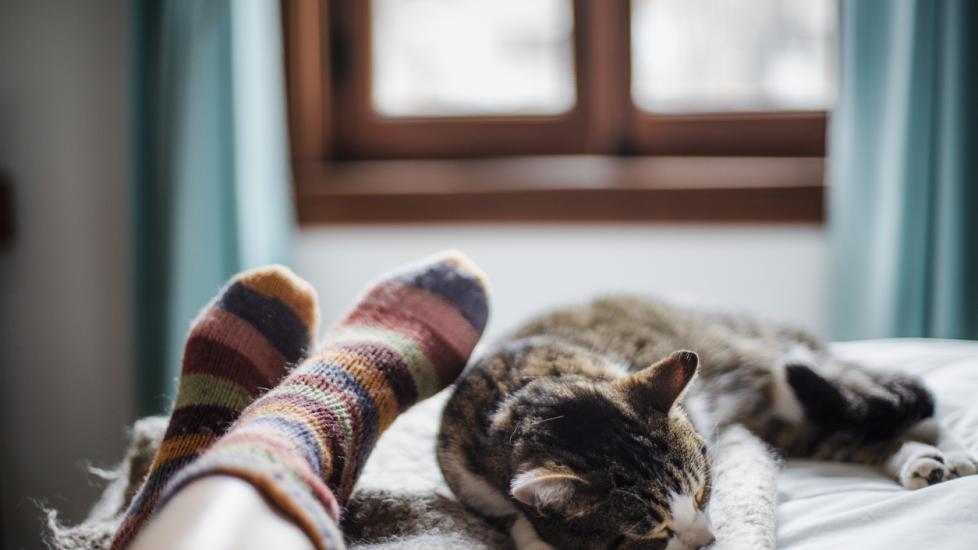Why Do Cats Sleep So Much?
Cats, like other animals, need a lot of sleep to stay healthy. But sometimes it might seem like your cat spends more time asleep than he does awake. Why do cats sleep so much? And what factors affect your kitty’s sleeping habits? Here’s what to know about all those catnaps.
How Many Hours a Day Does a Cat Sleep?
Cats sleep between 12–16 hours a day. To humans, who need about seven hours of sleep during adulthood, that seems like a lot of time spent snoozing. But when you think about it, it’s not too surprising that cats spend so much time resting.
Hunting and exploring are energy-consuming activities. As predators, cats need a lot more rest than humans so they can remain alert and focused.
The amount of time spent sleeping can depend on a cat’s life stage. Kittens are still growing and developing, so they’re likely to need up to 20 hours of sleep per day, while adult cats need 15 hours or less. It’s common for senior cats (those at least 10 years old) to spend more time asleep than younger cats, as they’re typically less active due to health issues or mobility loss.
7 Reasons Why Cats Sleep
Ultimately, how much a cat sleeps varies from pet to pet. Breed, diet, and lifestyle make a difference in how much cats sleep, along with age. For example, cats who lack mental stimulation often become lethargic and sleepy as a way of filling the time.
Here are some common reasons your cat sleeps so much.
1. They’re Taking Catnaps
It’s believed that cats don't really sleep for long stretches; rather, they take frequent catnaps that last 15–30 minutes. Catnaps allow your cat to rest his body and mind without falling into deep sleep. These catnaps allow felines to still react quickly to potential threats in their environment.
2. They’re Conserving Energy
Cats use a lot of energy when they hunt, play, or explore their environment—so it makes sense that they need to conserve energy by sleeping more. Your cat will be ready to tackle whatever activity he wants when he wakes up from a nap, whether that’s darting up a cat tree or chasing an interactive toy.
3. They’re on Their Own Time
Cats are crepuscular animals, which means they're most active at dawn and dusk. If your cat seems to sleep all the time, it could be because he’s actually awake at night. To keep your kitty from waking you up at sunrise, make sure he has things to do while you’re in bed, such as scratching on a post or looking out a window.
4. They’re Bored
Sometimes cats sleep because they’re bored. While sleeping might not seem like a big deal, boredom can lead to other problematic behaviors in cats, such as destruction, constant meowing, and over-grooming.
To stay engaged and prevent boredom, cats need stimulation throughout the day in the form of vertical territory (cat trees, scratching posts, and cat shelves), puzzle feeders, and regular playtime with the family. Another cat can also be a good companion during times when you can't give your cat a lot of attention—just make sure you introduce them properly.
5. They’re Stressed or Anxious
As with humans, cats are affected by stress. One way cats express stress or anxiety is by changing their sleep patterns. If they’re suddenly sleeping more than usual, it could be a sign they're feeling overwhelmed or anxious about something in their environment. Cats can become stressed or anxious for many reasons, such as when new family members come into the house or if feeding times change.
6. They’re Sick
Certain illnesses and diseases can also make your cat sleep more than usual. These include:
-
Heart disease
-
Cancer
Take your cat to the vet right away if you notice any other changes, such as loss of appetite or weight loss.
7. They’re Injured
Cats are agile creatures, often jumping from high places or running around at top speed. The downside is that this type of vigorous activity can sometimes result in muscle strains and torn ligaments. To rest and recuperate from these injuries, your cat might sleep more. Your cat might also sleep more if they have a wound or infection because their immune system is working overtime.
It’s also not uncommon for cats to develop arthritis and joint pain as they age. To relieve their discomfort, they may become lethargic and sleep more. A vet visit might be in order if your cat is lame or stiff. Your vet can diagnose the problem and come up with a treatment plan to help reduce pain and improve mobility so your cat can get back to napping.
Always take your cat to the vet as soon as possible when you notice signs of injury or that your cat is in pain. They can examine your pet and, if necessary, prescribe medication or suggest physical therapy to promote healing.
Is My Cat Sleeping Too Much?
If your is cat sleeping more than usual or if you notice any other behavioral changes with their sleeping habits, contact your veterinarian for advice. If your vet finds something wrong, they may suggest dietary changes, extra exercise, medications, supplements, or behavior modification training. But the fix could also be as simple as giving your kitty more toys and playtime!
Help us make PetMD better
Was this article helpful?
